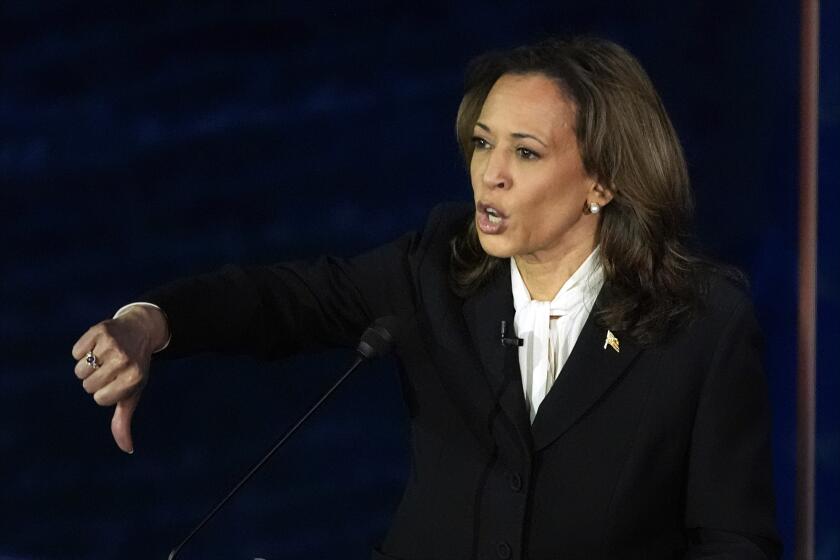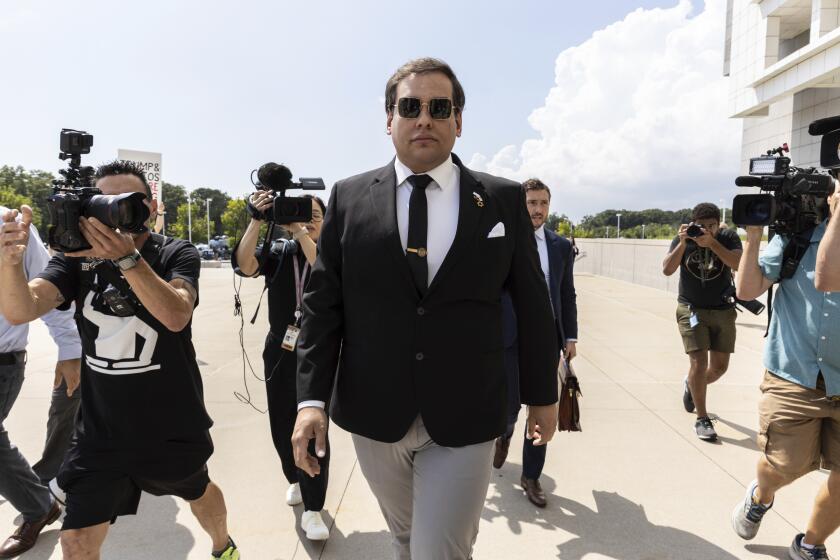Pakistan President Zardari sees popularity sink
Nearly a year into his term, people close to President Asif Ali Zardari say he knows just how low his popularity has sunk.
Pakistanis still call him “Mr. 10%,” a reference to corruption allegations that have dogged him since stints in previous decades as a Cabinet minister. The media jabs his inability to solve myriad crises, ranging from daily power shutdowns to a moribund economy. He gets little to no credit for the military offensive to tame local Taliban forces.
None of it fazes him, says Fauzia Wahab, a lawmaker with the ruling Pakistan People’s Party, or PPP, and a close ally of Zardari.
“He will come out of it,” she said. “He’s being portrayed as the worst kind of man. But he waits because he’s seen those days when he was portrayed as the villain of the country. He’s a very patient person.”
The rest of the country may not be as patient. Elected by Pakistan’s parliament and four provincial assemblies last September to a five-year term, the 54-year-old widower of slain former Prime Minister Benazir Bhutto is widely viewed in Pakistani society not as a helmsman, but a bystander.
It’s an image that is largely of Zardari’s own making, say analysts who contend that he has failed to forge any kind of connection with the Pakistani public.
Zardari’s public appearances are infrequent and he has held only two news conferences, both with visiting heads of state alongside. He has yet to set foot in the Swat Valley, a region his troops retook from Taliban insurgents who had extended their reach to within an hour’s drive of the capital.
“He knows how to work a crowd of politicians, but he doesn’t know how to connect with the public,” says Cyril Almeida, a columnist and editor at Dawn, a leading Pakistani newspaper. “There’s a sense that the guy’s in charge but doesn’t really know where he is. Has it sunk in yet that he’s president of 167 million people, and that it’s not about running a business anymore?”
It’s not just the public that is disillusioned with Zardari’s performance. Within his political party, there are growing concerns that his shaky leadership and dwindling popularity are weakening the organization at a time when its archrival, opposition politician Nawaz Sharif’s PML-N party, is gathering steam.
Wahab denies there is any dissension within the PPP ranks over Zardari’s leadership. But another lawmaker, Safdar Abbasi, who was with Bhutto when she died, disagrees.
“Right now, Zardari’s leadership isn’t being challenged, but the issue is that there’s immense dissension and disappointment among the party’s rank and file,” Abbasi said. “People are starting to feel that the hopes that they attached to Zardari after his election are fading. Things aren’t going the way they should.”
Almeida and other analysts say Zardari has squandered a golden opportunity to craft an image as a focused, rolled-up-sleeves leader. The timing couldn’t be better, they say. The political landscape has stabilized somewhat, an independent judiciary has been restored, and the military campaign has left the Taliban in a state of disarray.
Instead, Zardari continues to be perceived by Pakistanis as an accidental president who fell into the job through Bhutto’s December 2007 assassination, which left him leader of the PPP. According to a recent poll by the Pew Research Center, less than a third of Pakistanis have a favorable opinion of Zardari.
“I don’t trust him at all,” said Bilal Badshah, 23, in between tending to customers at a men’s clothing store in Islamabad, the capital. “He’s lost all credibility. Everything in this country is getting more expensive, people fear a bomb blast can happen at any time, and he hasn’t given any attention to these problems.”
Such deep distrust of Zardari is nothing new. He was widely reviled after being accused of demanding kickbacks while he served in Bhutto’s Cabinet in the late 1980s and again starting in 1993. Though never convicted, he was imprisoned from 1990 to 1993 and 1997 to 2004 in corruption cases that he has contended were politically motivated.
Still, when Zardari assumed the presidency last year, Pakistanis appeared ready to give him the benefit of the doubt. A Pew poll taken at the time found that 64% viewed him favorably.
Since then, however, several of his decisions have eroded his standing with the public.
He plunged the country into political crisis this year when he dissolved the Punjab provincial government, which was run by Sharif’s PML-N party. He also put Sharif under house arrest.
Zardari also initially reneged on a promise to reinstate popular Chief Justice Iftikhar Mohammed Chaudhry, who along with other high court judges, was ousted by the former president, Pervez Musharraf. Zardari reinstated Chaudhry in March only after a grass-roots movement of lawyers began street protests in Lahore and Islamabad.
Observers say he has had ample time to reinvent himself, and the successes against the Taliban in Swat would have been a good place to start. Pakistani troops have reasserted their authority over much of the Swat Valley and drove Taliban insurgents out of Swat’s cities and towns.
But Zardari has done little to convince the public that the fight against the Taliban is his war, analysts say. Consequently, Pakistanis credit the country’s military commanders.
“How many times has he been to Swat? None,” said Pakistani security analyst Ikram Sehgal. “If he really wanted to make his mark, he’d have a bigger public presence. The success of Swat is happening under his presidency. Why not build on that?”
Pakistanis don’t blame Zardari for the country’s economic woes or its electricity crisis, a problem of overburdened, poorly maintained infrastructure that led to violent protests this summer. For years, Musharraf put off expanding the capacity of the national power grid. And Pakistan was hit as hard by the global economic meltdown as other countries.
But Pakistanis do hold Zardari accountable for not doing enough to put the country’s economy on the right track or to avert the daily power shutdowns that plagued the country while it baked in withering summer heat.
“It was an enormous mess that we inherited from Musharraf,” said Almeida. “And much of it is not understood by people here. But people understand not having electricity, and they understand high gasoline taxes and food shortages. Those are the kinds of issues that decide whether a leader’s popularity goes up or down.”
--
More to Read
Sign up for Essential California
The most important California stories and recommendations in your inbox every morning.
You may occasionally receive promotional content from the Los Angeles Times.










